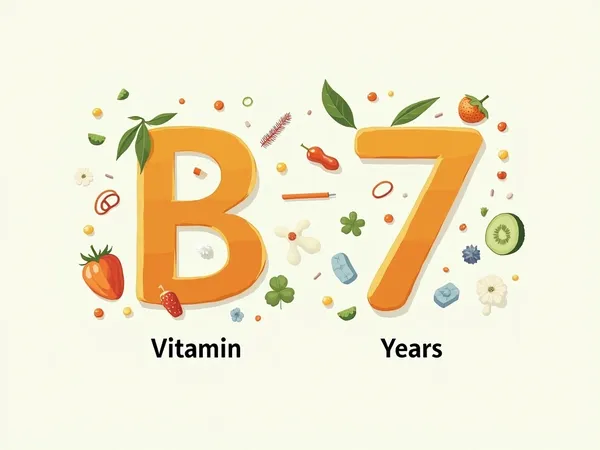
Ready to Start Your Wellness Journey?
Become a Herbalife Preferred Member and enjoy exclusive discounts of up to 25% on all products.
BECOME A PREFERRED MEMBERVitamin B7 Benefits for Hair Skin and Nail Health
Disclaimer: This article is for informational purposes only and should not be considered medical advice. Always consult a healthcare professional or a registered dietitian before making significant changes to your diet or starting any supplementation.
Introduction
Vitamin B7, also known as biotin, is a water-soluble B vitamin that serves as a coenzyme for carboxylase enzymes involved in energy production, fatty acid synthesis, and amino acid metabolism. It is essential for converting macronutrients into usable energy and supports healthy skin, hair, and nails when consumed in adequate amounts.
Many people may be unfamiliar with dietary sources of biotin, daily intake recommendations, and signs of deficiency. In this article, we review evidence-based functions of biotin, health considerations, and practical ways to meet requirements through diet and, when appropriate, supplementation.
Role in the Body
Biotin binds to four carboxylase enzymes, enabling key metabolic reactions:
Specific Functions
• Gluconeogenesis: Biotin-dependent pyruvate carboxylase converts pyruvate to oxaloacetate, supporting glucose production during fasting or increased energy demand.
• Fatty Acid Synthesis: Acetyl-CoA carboxylase requires biotin to form malonyl-CoA, the first step in long-chain fatty acid synthesis.
• Amino Acid Metabolism: Propionyl-CoA carboxylase and 3-methylcrotonyl-CoA carboxylase depend on biotin for the breakdown of certain amino acids, including leucine, isoleucine, and valine.
• Histone Biotinylation: Biotinylation of histones has been observed in laboratory studies, suggesting a potential role in chromatin structure, although its physiological significance in humans is still under investigation.
Effects of Deficiency
Overt biotin deficiency is rare but can occur in specific settings, such as untreated biotinidase deficiency or prolonged consumption of raw egg whites. Signs and symptoms may include:
• Dermatitis: Red, scaly rash typically around the eyes, nose, and mouth.
• Hair Changes: Hair thinning or brittle hair.
• Neurological Symptoms: Lethargy, depression, numbness, or tingling in the extremities.
• Metabolic Disturbances: Impaired gluconeogenesis, which may affect blood glucose stability.
In infants with inherited biotinidase deficiency who are not treated with biotin, more severe neurological and cutaneous symptoms can develop.
Dietary Sources
Biotin is found in a variety of foods. Most individuals consuming a balanced diet meet their biotin needs without supplementation.
Best Food Sources
• Egg yolks (cooked)
• Nuts and seeds (e.g., almonds, walnuts, peanuts)
• Organ meats (liver, kidney)
• Whole grains (oats, barley, wheat bran)
• Legumes (soybeans, lentils)
• Dairy products (milk, cheese, yogurt)
• Mushrooms
• Avocado
Supplementation
Supplementation may be medically indicated in the following situations:
• Biotinidase Deficiency: A genetic disorder requiring lifelong biotin to prevent neurological and dermatological complications.
• Prolonged Raw Egg Consumption: Avidin in raw egg whites can bind biotin and reduce its absorption; cooking eggs deactivates avidin.
• Poor Dietary Intake: Individuals with restrictive diets or malabsorption disorders may require a supplement under medical supervision.
When indicated, typical supplemental doses range from 30 mcg/day (to meet general needs) up to several hundred micrograms daily, depending on clinical guidance. Always follow a healthcare provider’s recommendations.
Health Benefits
Meeting biotin requirements supports normal metabolic functions and tissue health:
• Energy Metabolism: Essential for the activity of carboxylase enzymes that generate ATP from carbohydrates, fats, and proteins.
• Skin, Hair, and Nails: Contributes to the maintenance of structural proteins; deficiency can impair their integrity.
• Metabolic Homeostasis: Supports gluconeogenesis and fatty acid synthesis required for blood glucose regulation and lipid balance.
Daily Requirements
The Food and Nutrition Board of the U.S. Institute of Medicine has established Adequate Intake (AI) values for biotin, since an Estimated Average Requirement could not be determined due to the rarity of deficiency in healthy populations:
• Infants 0–6 months: 5 mcg/day
• Infants 7–12 months: 6 mcg/day
• Children 1–3 years: 8 mcg/day
• Children 4–8 years: 12 mcg/day
• Children 9–13 years: 20 mcg/day
• Teens 14–18 years: 25 mcg/day
• Adults 19+ years: 30 mcg/day
• Pregnant women: 30 mcg/day
• Breastfeeding women: 35 mcg/day
Tips for Incorporation
Practical ways to help meet biotin needs:
• Cook whole eggs (e.g., scrambled, omelets) to inactivate avidin and maximize biotin availability.
• Add nuts and seeds to salads, yogurt, or oatmeal for added biotin and healthy fats.
• Choose whole-grain breads, cereals, and pastas instead of refined grain products.
• Incorporate avocados into meals for a biotin boost along with monounsaturated fats.
• Include legumes, such as chickpeas and lentils, several times per week for both biotin and dietary fiber.
• If dietary intake is insufficient, consider a B-complex supplement containing at least 30 mcg of biotin, following label directions or professional advice.
Conclusion
Biotin (Vitamin B7) is a key coenzyme for metabolic carboxylases involved in energy production, fatty acid synthesis, and amino acid catabolism. Consuming a varied diet that includes egg yolks, nuts, seeds, whole grains, legumes, and select fruits and vegetables generally meets recommended intakes. In specific clinical conditions—such as biotinidase deficiency or prolonged consumption of raw egg whites—medical supplementation is necessary. Discuss any questions about biotin status or supplementation with a qualified healthcare professional to ensure safe and effective intake.
Ready to Start Your Wellness Journey?
Become a Herbalife Preferred Member and enjoy exclusive discounts of up to 25% on all products.
BECOME A PREFERRED MEMBER